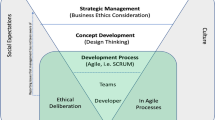Abstract
Among the various contemporary schools of moral thinking, consequence-based ethics, as opposed to rule-based, seems to have a good acceptance among professionals such as software engineers. But naïve consequentialism is intellectually too weak to serve as a practical guide in the profession. Besides, the complexity of software systems makes it very hard to know in advance the consequences that will derive from professional activities in the production of software. Therefore, following the spirit of well-known codes of ethics such as the ACM/IEEE’s, we advocate for a more solid position in the ethical education of software engineers, which we call ‘moderate deontologism’, that takes into account both rules and consequences to assess the goodness of actions, and at the same time pays an adequate consideration to the absolute values of human dignity. In order to educate responsible professionals, however, this position should be complemented with a pedagogical approach to virtue ethics.
Similar content being viewed by others
References
ACM/IEEE (2001). Computing curricula 2001, computer science, final report. The Joint Task Force on Computing Curricula, IEEE Computer Society and Association for Computing Machinery.
Online Ethics Center for Engineering. Glossary. Available at (http://onlineethics.org/).
Johnson, D. G. (1994). Computer ethics (2nd ed.). Upper Saddle River, NJ: Prentice Hall.
Watzlawick, P., Bavelas, J. B., & Jackson, D. D. (1967). Pragmatics of human communication. New York, NY: W. W. Norton & Company.
Spaemann, R. (2004). Moralische Grundbegriffe. München: Beck C. H.
ACM/IEEE (1999). Software engineering code of ethics and professional practice, v5.2. Available at (http://www.acm.org/serving/se/code.htm).
MacIntyre, A. (1981). After virtue. Notre Dame: University of Notre Dame Press.
Artz, J. M. (1994). Virtue versus utility: alternative foundations for computer ethics. In: Proceedings of the conference on ethics in the computer age (pp. 16–21). Galtinburg, Tennessee, United States, (http://doi.acm.org/10.1145/199544.199553).
Polo, L. (1996). Ética: hacia una versión moderna de los temas clásicos. Madrid: Unión Editorial.
Laudon, K. C. (1995). Ethical concepts and information technology. Communications of the ACM, 38(12), 33–39.
Weber, M. (1958). Politik als Beruf. Gesammelte Politische Schriften. Tübingen: Mohr. (Quotes from “Politics as Vocation”, Max Weber: Essay in Sociology. Translated by Hans H. Gerth and C. Wright Mills. New York: Oxford Univ. Press, 1946. Available at (http://www.ne.jp/asahi/moriyuki/abukuma/weber/lecture/politics_vocation.html).
Gotterbarn, D. (1995). The moral responsibility of software developers: three levels of professional software engineering. The Journal of Information Ethics, 4(1), 54–64.
United Nations (1948). Universal declaration of human rights. December 10th, 1948. Available at (http://www.un.org/Overview/rights.html).
Sommerville, I. (2004). Software engineering (7th ed.). Upper Saddle River, NJ: Pearson-Addison Wesley.
European Space Agency (1995). ESA PSS-05-10 guide to software verification and validation. ESA Board for Software Standardisation and Control.
Bott, F., Coleman, A., Eaton, J., & Rowland, D. (2001). Professional issues in software engineering (3rd ed.). London: Taylor & Francis.
Anscombe G. E. M. (1958). Intention. Oxford: Basil Blackwell.
Huff, C., & Martin, C. D. (1995). Computing consequences: a framework for teaching ethical computing. Communications of the ACM, 38(12), 75–84.
Gotterbarn, D., Miller, K., & Rogerson, S. (1999). Software engineering code of ethics is approved. Communications of the ACM, 42(10), 102–107.
Acknowledgements
The authors would like to thank the anonymous reviewers for their helpful comments that enabled us to improve the paper.
Author information
Authors and Affiliations
Corresponding author
Additional information
This research is supported through the Spanish Ministerio de Ciencia y Tecnología, Project TIN2004-07083, “GPS: Plataforma de Gestión de Procesos Software: modelado, reutilización y medición”.
A preliminar version of this paper has been published as “Ethical Responsibility of the Software Engineer”. Second International Workshop on Philosophical Foundations of Information Systems Engineering. Luxembourg, 5 June 2006. Held in conjunction with The 18th Conference on Advanced Information Systems Engineering-CAiSE 2006. Proceedings of CAiSE’06 Workshops and Doctoral Consortium, pp. 727–736.
Rights and permissions
About this article
Cite this article
Génova, G., González, M.R. & Fraga, A. Ethical Education in Software Engineering: Responsibility in the Production of Complex Systems. Sci Eng Ethics 13, 505–522 (2007). https://doi.org/10.1007/s11948-007-9017-6
Received:
Accepted:
Published:
Issue Date:
DOI: https://doi.org/10.1007/s11948-007-9017-6
Keywords
- Ethical responsibility
- Ethics of conviction
- Ethics of responsibility
- Deontologism
- Consequentialism
- Complexity of software systems
- Direct and foreseeable consequences
- Professional ethics
- Codes of ethics




